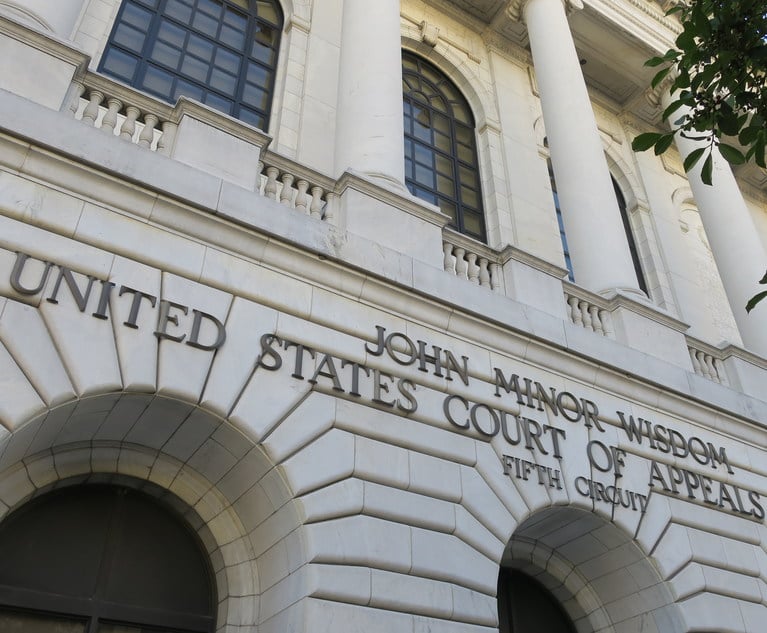Big Business Urges Justices to Uphold Bans on Employee Class Actions
Big-business advocates are lining up with the Trump administration's new position in the U.S. Supreme Court that workplace arbitration agreements banning class actions do not violate federal labor law.
June 21, 2017 at 02:51 PM
15 minute read
The original version of this story was published on National Law Journal
Big-business advocates are lining up with the Trump administration's new position in the U.S. Supreme Court that workplace arbitration agreements banning class actions do not violate federal labor law.
The organizations, including the U.S. Chamber of Commerce and the Retail Litigation Center, submitted friend-of-the-court briefs after acting Solicitor General Jeffrey Wall notified the court on June 16 that President Donald Trump's Justice Department was taking a different position than the Obama administration.
The justices next term will hear arguments in a trio of disputes that will be among the most closely watched business cases. More than 70 cases, representing major U.S. companies, were filed in the federal appeals courts. Appeals courts were divided in their rulings.
The three cases in the Supreme Court are: National Labor Relations Board v. Murphy Oil USA (from the U.S. Court of Appeals for the Fifth Circuit); Epic Systems v. Lewis (Seventh Circuit), and Ernst & Young v. Morris (Ninth Circuit). The high court will decide whether arbitration agreements are enforceable under the Federal Arbitration Act or whether they violate the National Labor Relations Act.
Most of the business groups filing amicus briefs are represented by veteran Supreme Court advocates. They include: Jones Day's Beth Heifetz for The Employers Group; Goodwin Procter's William Jay for The Business Roundtable; Mayer Brown's Andrew Pincus for the U.S. Chamber of Commerce; Jenner & Block's Adam Unikowsky for the Retail Litigation Center; and the Washington Legal Foundation's Richard Samp.
In the U.S. Chamber's brief, Pincus, among other arguments, contends the justices have “made clear” that a statute must expressly mention arbitration in order to displace the Federal Arbitration Act. “The NLRA says nothing about arbitration. Indeed, Section 7 does not mention class actions or joint litigation—and its general reference to 'other concerted activities' is at the very most ambiguous about whether such activities are protected, which is insufficient to overcome the FAA,” Pincus wrote in the brief.
Jay, in his brief for The Business Roundtable, said a decision that says class action waivers violate the labor law “would force employers to undergo 'arbitration' that is bereft of the benefits of arbitration, shorn of the efficiency and cost savings that make arbitration favored in the first place. Nothing in the collective bargaining provisions of the NLRA compels such a result.”
Friend-of-the-court briefs supporting employees in the three cases are not yet due.
The question before the justices arose from a 2012 ruling by the NLRB in D.R. Horton. That decision said agreements requiring employees to use individual arbitration for all work-related disputes interfered with employees' right to engage in “other concerted activities,” including class and collective actions. The board said that when such an agreement violates the NLRA, the FAA does not require its enforcement.
Last fall, Deputy Solicitor Edwin Kneedler filed a petition in the Supreme Court on behalf of the NLRB, which had lost in the Fifth Circuit. “The board, which is charged with enforcing the NLRA, has reasonably concluded that such agreements are unlawful under that act, because they would deprive employees of their statutory right to engage in 'concerted activities' in pursuit of their 'mutual aid or protection,'” Kneedler wrote.
The Trump administration's amicus brief this month announced the government's changed position. Wall, the acting solicitor, told the high court: “We do not believe that the board in its prior unfair-labor-practice proceedings, or the government's certiorari petition in Murphy Oil, gave adequate weight to the congressional policy favoring enforcement of arbitration agreements that is reflected in the FAA.”
The NLRB is likely now to look in-house for counsel to defend its position unless the board's composition changes and it repudiates that position between now and the Aug. 9 deadline for filing its brief on the merits.
Copyright National Law Journal. All rights reserved. This material may not be published, broadcast, rewritten, or redistributed.
This content has been archived. It is available through our partners, LexisNexis® and Bloomberg Law.
To view this content, please continue to their sites.
Not a Lexis Subscriber?
Subscribe Now
Not a Bloomberg Law Subscriber?
Subscribe Now
NOT FOR REPRINT
© 2025 ALM Global, LLC, All Rights Reserved. Request academic re-use from www.copyright.com. All other uses, submit a request to [email protected]. For more information visit Asset & Logo Licensing.
You Might Like
View All
Sanctions Order Over Toyota's Failure to Provide English Translations of Documents Vacated by Appeals Court
4 minute read
Second Circuit Upholds $5M Judgment Against Trump in E. Jean Carroll Case
4 minute read
Legal Issues to Watch in the US Appeals Courts in 2025

Plaintiffs Seek Redo of First Trial Over Medical Device Plant's Emissions
4 minute readTrending Stories
- 1Milbank, Wachtell, Ropes and Pittsburgh Duo Aim to Save Nippon Steel-U.S. Steel Merger
- 2A Top Connecticut Lawyer Has Resigned
- 3Just Ahead of Oral Argument, Fubo Settles Antitrust Case with Disney, Fox, Warner Bros.
- 4Best Practices for Adopting and Adapting to AI: Mitigating Risk in Light of Increasing Regulatory and Shareholder Scrutiny
- 5FOMO Run Amok? Resolve of Firms Chasing AI Dreams Tested by Sky-High Costs
Who Got The Work
Michael G. Bongiorno, Andrew Scott Dulberg and Elizabeth E. Driscoll from Wilmer Cutler Pickering Hale and Dorr have stepped in to represent Symbotic Inc., an A.I.-enabled technology platform that focuses on increasing supply chain efficiency, and other defendants in a pending shareholder derivative lawsuit. The case, filed Oct. 2 in Massachusetts District Court by the Brown Law Firm on behalf of Stephen Austen, accuses certain officers and directors of misleading investors in regard to Symbotic's potential for margin growth by failing to disclose that the company was not equipped to timely deploy its systems or manage expenses through project delays. The case, assigned to U.S. District Judge Nathaniel M. Gorton, is 1:24-cv-12522, Austen v. Cohen et al.
Who Got The Work
Edmund Polubinski and Marie Killmond of Davis Polk & Wardwell have entered appearances for data platform software development company MongoDB and other defendants in a pending shareholder derivative lawsuit. The action, filed Oct. 7 in New York Southern District Court by the Brown Law Firm, accuses the company's directors and/or officers of falsely expressing confidence in the company’s restructuring of its sales incentive plan and downplaying the severity of decreases in its upfront commitments. The case is 1:24-cv-07594, Roy v. Ittycheria et al.
Who Got The Work
Amy O. Bruchs and Kurt F. Ellison of Michael Best & Friedrich have entered appearances for Epic Systems Corp. in a pending employment discrimination lawsuit. The suit was filed Sept. 7 in Wisconsin Western District Court by Levine Eisberner LLC and Siri & Glimstad on behalf of a project manager who claims that he was wrongfully terminated after applying for a religious exemption to the defendant's COVID-19 vaccine mandate. The case, assigned to U.S. Magistrate Judge Anita Marie Boor, is 3:24-cv-00630, Secker, Nathan v. Epic Systems Corporation.
Who Got The Work
David X. Sullivan, Thomas J. Finn and Gregory A. Hall from McCarter & English have entered appearances for Sunrun Installation Services in a pending civil rights lawsuit. The complaint was filed Sept. 4 in Connecticut District Court by attorney Robert M. Berke on behalf of former employee George Edward Steins, who was arrested and charged with employing an unregistered home improvement salesperson. The complaint alleges that had Sunrun informed the Connecticut Department of Consumer Protection that the plaintiff's employment had ended in 2017 and that he no longer held Sunrun's home improvement contractor license, he would not have been hit with charges, which were dismissed in May 2024. The case, assigned to U.S. District Judge Jeffrey A. Meyer, is 3:24-cv-01423, Steins v. Sunrun, Inc. et al.
Who Got The Work
Greenberg Traurig shareholder Joshua L. Raskin has entered an appearance for boohoo.com UK Ltd. in a pending patent infringement lawsuit. The suit, filed Sept. 3 in Texas Eastern District Court by Rozier Hardt McDonough on behalf of Alto Dynamics, asserts five patents related to an online shopping platform. The case, assigned to U.S. District Judge Rodney Gilstrap, is 2:24-cv-00719, Alto Dynamics, LLC v. boohoo.com UK Limited.
Featured Firms
Law Offices of Gary Martin Hays & Associates, P.C.
(470) 294-1674
Law Offices of Mark E. Salomone
(857) 444-6468
Smith & Hassler
(713) 739-1250








